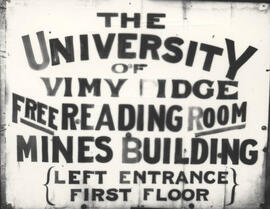- PR 04
- Archief
- 1911–1935
The fonds consists of records by and relating to E.H. Oliver, his travels in Saskatchewan and his teaching at St. Andrew’s College, his experiences in the First World War and involvement with educational programs for the soldiers (through the University of Vimy Ridge and Khaki University), his postwar work as Principal of St. Andrew’s College and later Moderator of the United Church, and his research and publications.
Contents include: correspondence (1911-1916); diary of trips to the Doukhobor area around Veregin (1915), the Cote Reserve, and to the Ruthenians of Kamsack and Canora; military publications and wartime memorabilia; materials related to the University of Vimy Ridge (1917-1918) and Khaki University (1917-1919); Oliver’s postwar correspondence (1920-1935), as he resumed his duties as Principal of St. Andrew’s College; and various historical and research publications and manuscripts, on topics such as Church Union, education, Saskatchewan history and settlement. There is also a collection of material pertaining to the drought situation on the prairies and the United Church response (1930-1932), at which time Oliver was serving as Moderator.
The collection also includes letters and tributes to E.H. Oliver, from after his death (1935-1936).
Zonder titel

